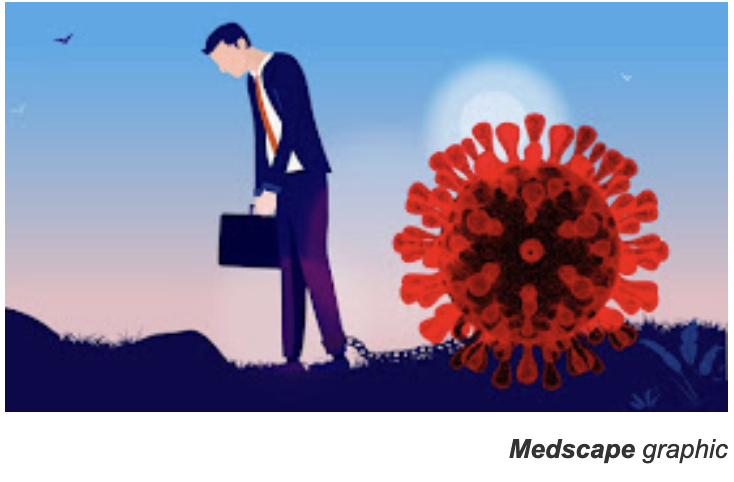Long Covid is keeping many Americans from returning to work

About 16 million Americans have long Covid-19 and four million of them say this has significantly reduced their ability to carry out day-to-day activities, including their jobs, Paul Solman reports for PBS News Hour.
Long Covid, also called long-haul Covid, post-Covid or chronic Covid, occurs when Covid-19 symptoms continue long after the initial infection.
The American Medical Association says “fatigue and “brain fog” are among the most-reported symptoms of long Covid. According to an article in the AMA journal JAMA Network, other symptoms include insomnia, changes in smell and taste, shortness of breath, chest pain, palpitations, dizziness, depression and anxiety. In some cases, the symptoms are disabling, preventing patients from working or even going about their normal daily activities.”
David Lazer of Boston’s Northeastern University told Solmon that 16 percent of people with long Covid are less likely to be employed.
Katie Bach, a Brookings Institution researcher, told Solmon that she estimates about 500,000 people are no longer working because of long Covid, and not including people who have reduced their work hours or days.
“We do have a big long-Covid problem,” she said. “And the afflicted don’t appear to be coming back anytime soon, due to a slew of symptoms.”
One of the many long-Covid patients no longer able to work is Meredith Hurst, who was a paralegal in Wilmington, Delaware. Solmon reports that Hurst hasn’t been able to work in three years and doing the interview was a struggle.
“I have to prepare … by resting days in advance. . . . I also get extremely exhausted getting dressed,” Hurst told him. Her daughter, six-year-old Carly Anna Hurst, told Solman that her mom is no longer able to take walks or do picnics with her. Her son Dan, 22, said their mother is bedridden “at least a good bit of the day, every day.”
Another long-Covid sufferer unable to work is Phillip Baczewski, a longtime Massachusetts social worker. Baczewski said he has been heartbroken that he can no longer do the adoption work that he loves, and spoke about his struggles with depression and suicide ideation and rage, saying there have been times when he didn’t leave his room for days.
Chimere Smith, who was a teacher in Baltimore schools before she got sick and quit working, said she too had times when she just wanted to die. She called long Covid a “sneaky, invisible condition that people don’t recognize unless there are visible symptoms.” She said because she is no longer able to work, “Eighty percent of my income is government assistance,” Social Security, subsidized housing and food stamps.
Bach, of the Brookings Institution, told Solmon that the impact on the economy is estimated to cost hundreds of billions. “It includes lost wages for people who are not working,” she said. “It includes increased health-care costs, and then there’s lost quality of life, which is a concept in health economics where there is a cost to people suffering.”